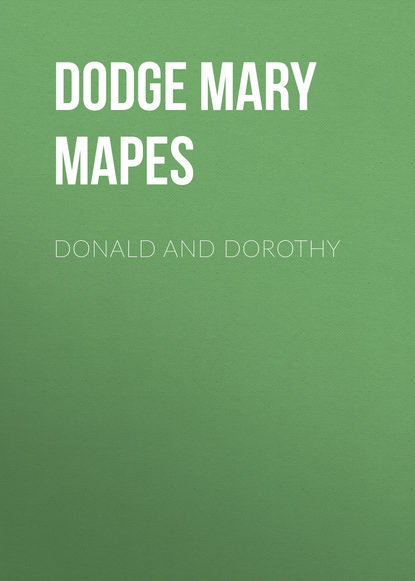По всем вопросам обращайтесь на: info@litportal.ru
(©) 2003-2024.
✖
Donald and Dorothy
Настройки чтения
Размер шрифта
Высота строк
Поля
Lydia looked up when Donald and Dorothy entered, with a "Sakes! You've not been fretting again, Miss Dorry?"
"No – not exactly fretting, Liddy; that is, not very much. We just came down to – to – Give me an apple?"
"Steady! St-e-a-dy!" cried Liddy, as after her hearty "help yourselves," the brother and sister made a simultaneous dash at the pan on her ample lap, playfully contesting for the largest. "One would think you were starving."
"So we are, Liddy," said Dorothy, biting her apple as she spoke; "we are starving for a story."
"Yes!" echoed Donald, "a story. We're bound to have it!"
"Hum!" muttered Liddy, much flattered. "Do you know your lessons?"
"Per-fectly!" answered the D's, in one breath. "We studied them right after Dr. Lane left."
"Well," began Liddy, casting a furtive look at the old mahogany clock on the mantel; "which story do you want? You've heard 'em all a score of times."
"Oh, not that kind," said Dorothy, playfully motioning to her brother, for you see by this time she was quite cheerful again. "We want a certain par-tic-ular story, don't we, Don?"
Instead of replying, Don took Dorry's outstretched hand with nonsensical grace, and so dancing to the fireplace together, in a sort of burlesque minuet, they brought back with them two little mahogany and hair-cloth foot-benches, placing them at Lydia's feet.
Ignoring the fact that these well-worn seats were absurdly low and small, the D's settled themselves upon them as comfortably as in the days gone by, when the benches had been of exactly the right size for them; and at the risk of upsetting the apples, pan and all, they leaned toward Liddy with an expressive "Now!"
All this had been accomplished so quickly, that Liddy would have been quite taken by surprise had she not been used to their ways.
"Bless your bright eyes!" she laughed, uneasily looking from one beaming face to the other; "you take one's breath away with your quick motions. And now what certain, special, wonderful kind of a story do you want?"
"Why, you know. Tell us all about it, Lydia," spoke Dorothy, sobered in an instant.
"Sakes! Not again? Well, where shall I begin?"
"Oh, at the very beginning," answered Donald; and Dorothy's eager, expressive nod said the same thing.
"Well," began Lydia, "about fourteen years ago – "
"No, no, not there, please, but 'way, away back as far as you can remember; farther back than you ever told us before."
"Well," and Lydia proceeded to select a fresh apple and peel it slowly and deliberately; "well, I was once a young chit of a girl, and I came to this house to live with your Aunt Kate. She wasn't any aunt then, not a bit of it, but a sweet, pretty, perky, lady-girl as ever was; and she had" (here Liddy looked sad, and uttered a low "Dear, dear! how strange it seems!") – "she had two splendid brothers, Mr. George Reed and Mr. Wolcott Reed (your papa, you know). Oh, she was the sweetest young lady you ever set eyes on! Well, they all lived here in this very house, – your grandpa and grandma had gone to the better world a few years before, – and Master G. was sort of head of the family, you see, as the oldest son ought to be."
Donald unconsciously sat more erect on his bench, and thrust his feet farther forward on the carpet.
"Yes, Master G. was the head," Liddy went on, "but you wouldn't have known it, they were all so united and loving-like. Miss Kate, though kind of quick, was just too sweet and good for anything, – 'the light of the house,' as the young master called her, and – "
"Oh, I do love so much to hear about Aunt Kate!" exclaimed Dorothy, her color brightening as she drew her bench up still closer to Liddy. Both of the apples were eaten by this time, and the D's had forgotten to ask for more. "Do we look like her?"
Here Donald and Dorothy turned and gazed full in Lydia's face, waiting for the answer.
"Well, yes – and no, too. You've her shining dark hair, Master Donald, and her way of steppin' firm, but there isn't a single feature like her. And it's so with you, Miss Dorry, not a feature just right for the likeness; still you've a something, somehow – somewhere – and yet I can't place it; it's what I call a vanishin' likeness."
At this the two D's lost their eager look, and burst into a hearty laugh.
"Hello, old Vanisher!" said Donald, making a sudden dive at Dorothy.
"Hello, old Stiff-legs!" retorted Dorothy, laughing and pushing him away.
Here old Nero roused himself, and growled a low, rumbling, distant growl, as if protesting against some unwelcome intruder.
"There, children, that's sufficient!" said Liddy, with dignity. "Don't get tussling. It isn't gentleman-and-lady-like. Now see how you've tumbled your sister's hair, Master Donald, and Mr. G.'s so particular. Hear Nero, too! Sakes! it seems sometimes like a voice from the dead to hear him go that way when we're talking of old times."
"Be still, old fellow!" cried Donald, playfully. "Don't you see Liddy's talking to us? Well, we look like our mamma, any way, – don't we, Liddy?"
"That picture of your mamma in your room, Master Donald," replied Lydia, "has certainly a good deal of your look, but I can't say from my own knowledge that it ever was a good likeness. It was sent over afterward, you know, and your mamma never was here except once, and then it so happened I was off to camp-meeting with Cousin Crump. Your papa used to go to see the young lady down at her home in New York, and after the wedding they went to Niagara Falls, and after that to Europe. Seems to me this going out of your own country's a bad business for young couples who ought to settle down and begin life." (Here Nero stood up, and his growl grew more decided.) "Well, as I was saying – Mercy on us! If there isn't that man again!"
The last part of Lydia's sentence, almost drowned by Nero's barking, was addressed to the empty window; at least it was empty when the D's turned toward it.
"Who? where?" shouted Dorothy. But Donald sprang up from the bench, and, followed by the noisy old Nero, ran out of the room, across the basement-hall, and through the back-door, before Lydia had time to reply.
"Who was it, Liddy?" asked Dorry, still looking toward the empty window, while Nero came sauntering back as though the matter that had lured him forth had not been worth the trouble of following up.
"Oh, no one, dearie," said Lydia, with assumed carelessness; "that is, no one in particular. It's just a man. Well, as I was saying, your Aunt Kate wasn't only the light of the house, she was the heart of the house, too, the very heart. It was dreary enough after she went off to England, poor darling."
"Yes, yes, go on," urged Dorry, earnestly, at the same time wondering at her brother's hasty departure. "Go on, Liddy, that's a dear. I can repeat it all to Donald, you know."
"There isn't any more, Miss Dorry. That's the end of the first part of the story. You know the second well enough, poor child, and sad enough it is."
"Yes," said Dorry, in a low tone, "but tell me the rest of the beginning."
"Why, what do you mean, Miss Dorry? There's nothing else to tell, – that is, nothing that I got ear of. I suppose there were letters and so on; in fact, I know there were, for many a time I brought Mr. George's mail in to him. That day, I took the letters and papers to Mr. G. in the library, – poor, lonely gentleman he looked! – and then I went down to my kitchen fire (I was in the housework then), and some minutes after, when I'd been putting on coal and poking it up bright, it kind o' struck me that the master's bell had been ringing. Up I hurried, but when I reached the library, he was gone out, and no one was there but Nero (yes, you, old doggie!), lying before the fire, as if he owned the house. And that's the end of the first part, so far as I know."
"Yes," persisted Dorothy; "but I want to hear more about what happened before that. I know about our poor papa dying abroad, and about the wreck, and how our mamma and – "
She could not go on. Often she could speak of all this without crying; but the poor girl had been strained and excited all the afternoon, and now, added to the sorrow that surged through her heart at the sudden thought of the parents whom she could not even remember, came the certainty that again she was to be disappointed. It was evident, from Lydia's resolute though kindly face, that she did not mean to tell any more of the first half of the story.
The good woman smoothed Dorothy's soft hair gently, and spoke soothingly to her, begging her to be a good girl and not cry, and to remember what a bright, happy little miss she was, and what a beautiful home she had, and how young folk ought always to be laughing and skipping about, and —
"Liddy!" said Donald, suddenly appearing at the door. "Uncle wishes to see you."
Lydia, flushing, set down the pan, and, hurriedly smoothing her apron, walked out of the room.
"Uncle called me from the window – that's why I stayed," explained Donald, "and he told me to bid Jack hitch the horses to the big carriage. We're to get ready for a drive. And then he asked me where you were, and when I told him, he said: 'Send Lydia here, at once.'"
"Was Uncle very angry, Donald?" asked Dorry, wiping her eyes.
"Oh, no. At first he seemed sorry, and I think he got up the drive just to give you pleasure, Dorry. He wanted to see me about something, and then he asked more about our visit to Liddy's room, and I told him she was only telling us a true story about him and our father, and – and that's when he sent me for Liddy, before I could say another word. Don't cry any more, Dot, – please don't. Go put on your things, and we'll have a gay old drive with Uncle. I'll not take the pony this time."
"Oh, do!" coaxed Dorry, faintly, for in her heart she meant, "Oh, don't!" It was good in Donald, she knew, to be willing to give up his pony-ride, and take a seat in the stately carriage instead of cantering alongside, and she disliked to rob him of the pleasure. But to-day her heart was lonely; Uncle had been "queer," and life looked so dark to her in consequence, that to have Donald on the same seat with her would be a great comfort.
"No," said Don. "Some day, soon, you and I will take our ponies, and go off together for a good run; but to-day I'd rather go with you in the carriage, Dot," – and that settled it.
She ran to put on her hat and bright warm woollen wrap, for it was early November, and beginning to be chilly. The carriage rolled to the door; Uncle George, grave but kind, met her, handed her in as though she were a little duchess, and then said: —






